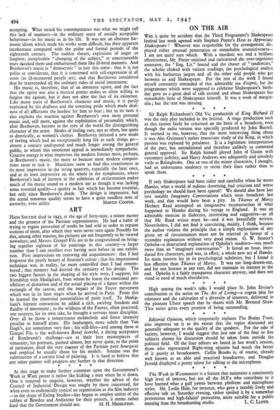MUSIC
THE Busch Quartet played two of the op. 18 quartets (Nos. I and 4), the first Rasumovsky and op. 131 and 132 at their concerts on April 25th and 28th. The L.P.O. under de Sabata have already played the second, fourth, fifth and seventh symphonies at their first two concerts ; and all this Beethoven activity suggests some fugitive thoughts on this most puzzling composer. '
With Beethoven the personality of the composer makes a sudden appearance in music on an entirely new scale. No listener to any major work after, say, the second symphony can fail to be aware of the various facets of Beethoven's character, often contradictory, always extreme. There is the pawky humorist, the conscious Titan (" my head is bloody but unbowed "), the humanitarian idealist ; but, in whatever role, it is Beethoven the man who speaks, incredibly violent and extreme, taking you by the coat-collar and putting his face close to yours to compel your attention, bursting into sudden gusts of laughter, stamping up and down the room as he talks at top speed, suddenly serious and tensely emotional—an unpredictable creature of moods which his audience are forced, not led, into accepting. What struck his contemporaries was what we might call this lack of manners—in the ordinary sense of socially acceptable behaviour—in his music as in his life. It was not an abstruse har- monic idiom which made his works seem difficult, but their apparent incoherence compared with the polite and formal periods of the eighteenth century. The sudden shouts, explosions of anger or laughter, inexplicable " changing of the subject," or unaccountable tears shocked them and embarrassed them like ill-bred manners. And Beethoven's music is " democratic " in just this sense : that it is not polite or considerate, that it is concerned with self-expression at all costs (as ill-mannered people are), and that Beethoven considered that he transcended all the ordinary rules of social intercourse.
His music is, therefore, that of an immense egoist, and the fact that the egoist was also a musical genius makes us often willing to forgive the egoism, but it does not alter the fact of its existence. Like many traits of Beethoven's character and music, it is partly explained by his deafness and the towering pride which made deaf- ness of all afflictions the hardest for him to bear ; but in its turn it • also explains the reaction against Beethoven's own most personal music and, still more, against the exploitation of personality which, after Beethoven, became in the eyes of the world the distinguishing character of the artist. Modes of feeling vary, not so often, but quite as drastically, as women's clothes. Beethoven initiated a new mode of feeling which had an exceptionally long life as such things go— almost a century undisputed and much longer among the general public, to whom this emotional appeal is immediately sympathetic. Creative energy is what impresses the modern listener most, perhaps, in Beethoven's music, the more so because most modern composi- tions seem to lack it. Musicians seem to find this creativeness at its most impressive in the string quartets, especially the later ones, and at its least impressive on the whole in the symphonies, where Beethoven's lack of interest in the subtleties of orchestration makes much of his music sound to a modern ear as though it was lacking some essential quality—a quality in fact which has become essential, but only since Beethoven's death. The design is impressive, but the actual sonorous quality seems to have a quite needless note of



































 Previous page
Previous page